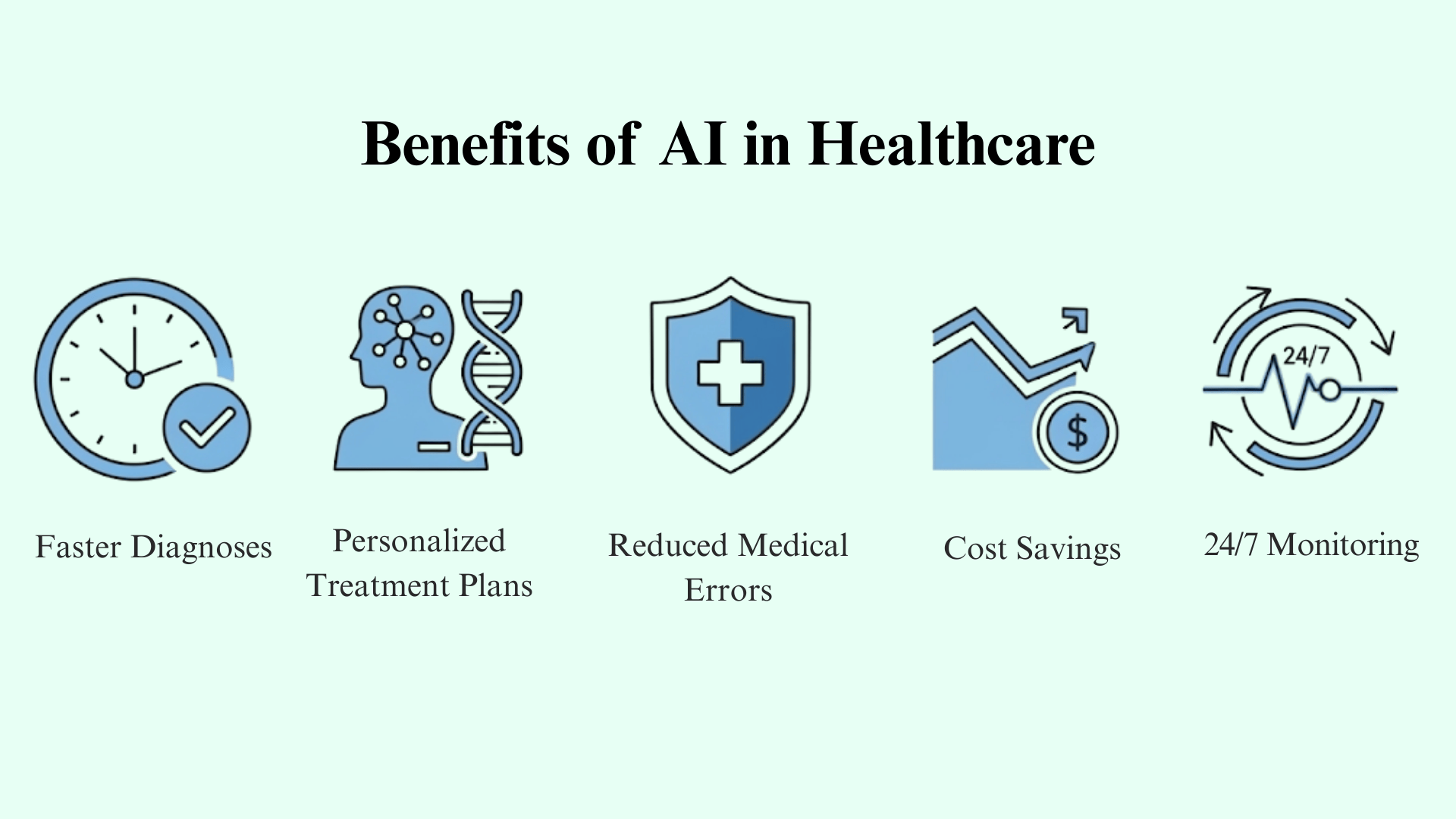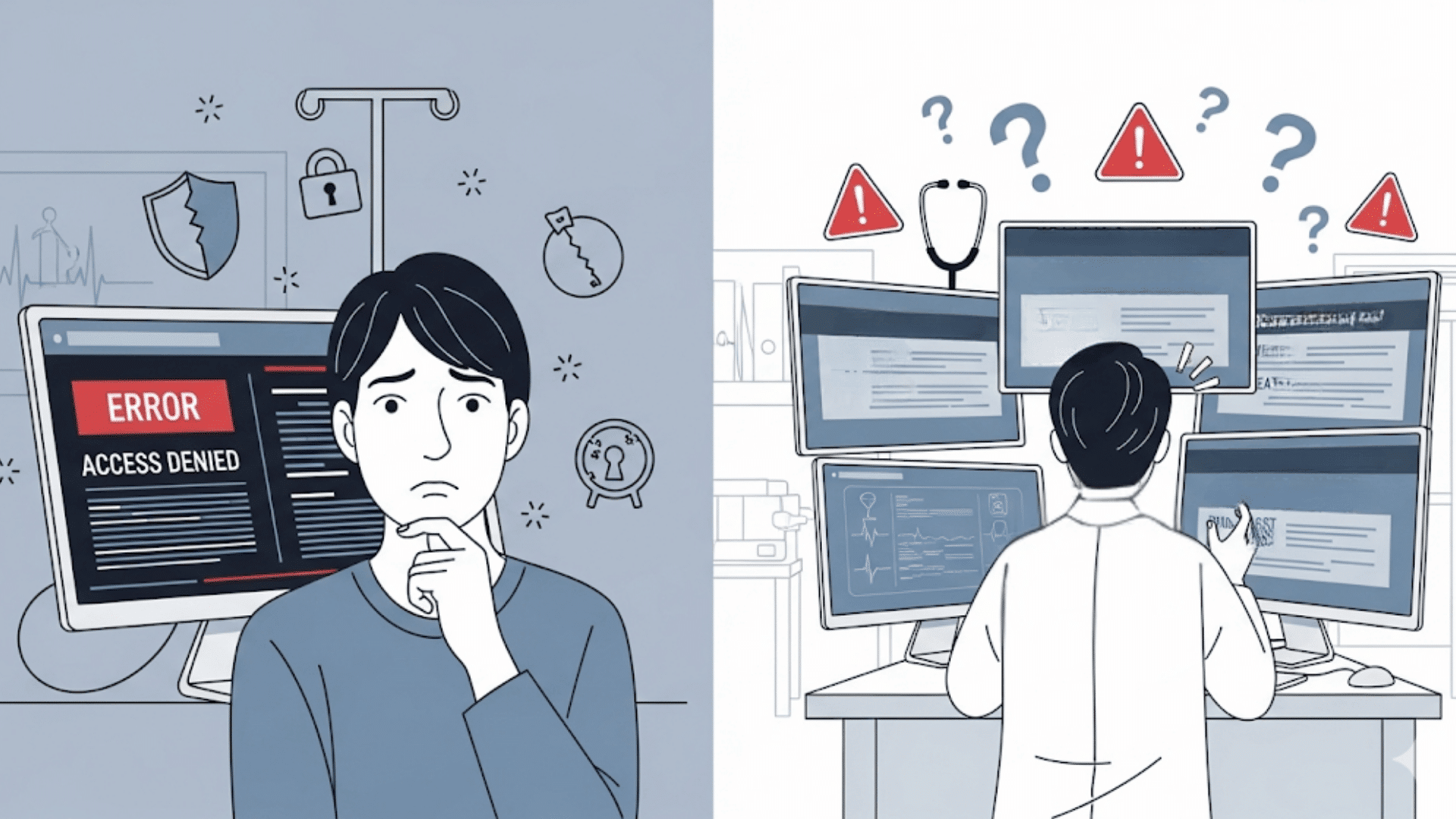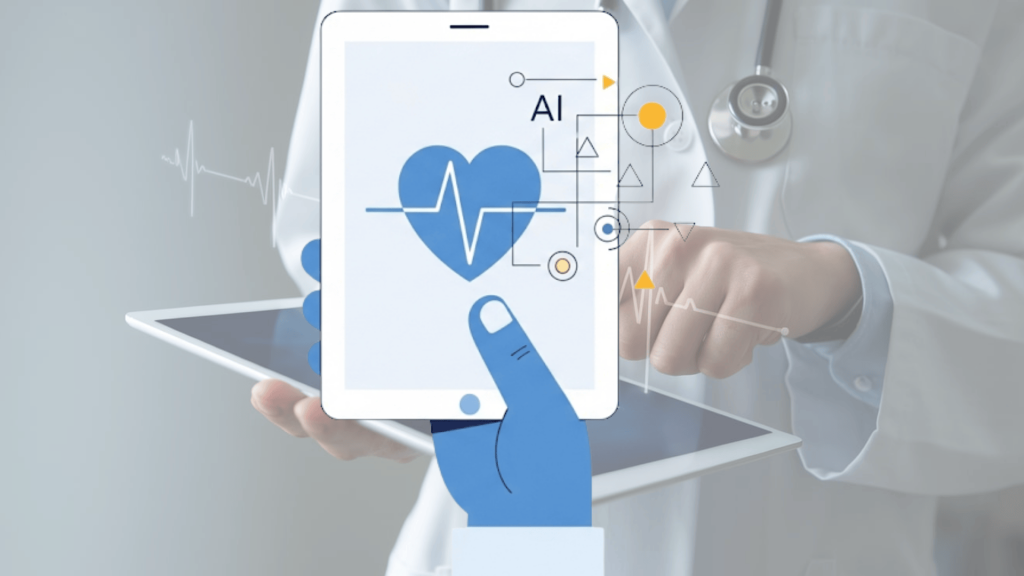Have you ever wondered how artificial intelligence is changing the way doctors treat patients today?
AI is no longer something from movies. It’s happening right now in hospitals worldwide. Doctors utilize intelligent systems to diagnose diseases more quickly and perform surgeries with greater precision.
However, like any powerful technology, AI presents both exciting benefits and genuine concerns. Some worry about medical data privacy. Others question whether machines can match human medical judgment.
In this blog, I’ll show you exactly how AI is being utilized in healthcare today. You’ll learn the biggest benefits, main risks, and real examples of AI tools helping patients today.
What is AI in Healthcare?
AI in healthcare refers to the use of intelligent computer systems that can learn and think like humans to assist with medical tasks.
These systems analyze medical information, recognize patterns in health data, and help doctors make more informed decisions for their patients.
Think of AI as a super-smart medical assistant. It can process thousands of medical records, scan images, and spot health problems much faster than any human could alone.
Types of AI Used in Healthcare
Here are the main types of AI currently helping doctors and patients:
| AI Type | What It Does | Example Use |
|---|---|---|
| Machine Learning | Gets smarter from medical data | Predicts patient health risks |
| Image Recognition | Analyzes medical scans and photos | Detects cancer in X-rays |
| Natural Language Processing | Understands medical notes and reports | Organizes patient records |
| Predictive Analytics | Forecasts health problems | Warns about potential complications |
Key Benefits of AI in Healthcare

AI is already changing healthcare for the better. Here are the primary ways it’s currently benefiting doctors and patients.
1. Faster and More Accurate Diagnoses
AI can analyze medical images in seconds, not hours. This speed helps doctors catch diseases early when they’re easier to treat.
Real Example: Google’s AI system can accurately identify diabetic eye disease in photos with over 90% accuracy. This prevents blindness by catching problems before patients even notice symptoms.
Why This Matters:
- Patients get results faster
- Early detection saves lives
- Doctors can focus on treatment instead of analysis
2. Personalized Treatment Plans
AI helps doctors select the most effective treatments for each individual patient. By analyzing thousands of similar cases, AI can predict which treatments are most effective for specific conditions and patient types.
Key Benefits:
- Treatment plans fit each patient’s unique needs
- Better success rates for medical procedures
- Fewer side effects from wrong treatments
- Faster recovery times
3. Reduced Medical Errors
Human doctors sometimes make mistakes when they’re tired or dealing with complex cases. AI systems don’t get tired and can continuously double-check medical decisions.
How AI Prevents Errors:
- Flags dangerous drug combinations
- Double-checks diagnosis accuracy
- Alerts staff to critical changes in patient condition
- Reviews treatment plans for potential problems
4. Significant Cost Savings
AI makes healthcare more affordable for everyone by reducing waste and improving efficiency.
Cost Savings Include:
- Fewer repeat tests – AI gets it right the first time
- Early problem detection – treating issues before they become expensive
- Automated routine tasks – staff can focus on direct patient care
- Prevented medical errors – avoiding costly mistakes and lawsuits
5. Round-the-Clock Patient Monitoring
AI-powered devices can continuously monitor patients and alert medical staff instantly when an issue arises.
Monitoring Benefits:
- Immediate alerts for emergency situations
- Continuous vital sign tracking
- Early warning for health complications
- Better care in intensive care units
What Could Go Wrong with AI in Healthcare?

While AI offers exciting benefits for healthcare, it’s essential to understand the potential downsides before fully embracing this technology.
1. Privacy and Data Security Issues
AI systems need access to vast amounts of personal medical information to work effectively.
This creates serious concerns about who can access this sensitive data and how well it’s protected from breaches or misuse.
Medical records contain some of our most private information, and data breaches could expose these details to hackers or insurance companies that might use them to discriminate based on health predictions.
2. Bias in AI Decision-Making
AI systems learn from data created by humans, so if this training data contains biases, the AI will also make biased decisions.
This means some patient groups might receive worse care recommendations than others. For example, AI might work better for certain ethnicities or genders because the training data wasn’t diverse enough to represent all populations fairly.
3. Over-Dependence on Technology
There’s a real risk that doctors might start trusting AI recommendations more than their own medical expertise and direct patient interaction.
This could lead to important patient context being ignored or human empathy decreasing in medical care.
When doctors rely too heavily on AI, they might stop developing critical thinking skills and miss important details that only human judgment can catch.
4. Job Displacement Concerns
While AI won’t replace most healthcare workers, it will undoubtedly change the way many medical jobs are performed.
Some roles, like medical imaging technicians and data entry specialists, face the highest risk of automation.
However, jobs requiring direct patient care, complex surgery, and mental health counseling will remain human-centered, as they necessitate empathy and complex decision-making that AI cannot replicate.
5. Lack of Transparency in AI Decisions
Many AI systems operate like “black boxes,” where even their creators don’t fully understand how they arrive at certain medical conclusions.
This makes it extremely difficult for doctors to explain AI recommendations to their patients.
When patients can’t understand why AI suggested a particular treatment, it creates trust issues and makes it harder to catch potential AI mistakes before they affect patient care.
Real-World Uses of AI in Healthcare Today
Now that we’ve explored both the benefits and drawbacks of AI in healthcare, let’s examine how this technology is currently being applied in hospitals and clinics.
1. Medical Imaging and Radiology
- IBM Watson for Oncology analyzes cancer cases and suggests treatment options used in hospitals worldwide for better cancer care.
- PathAI System helps pathologists diagnose diseases from tissue samples with increased accuracy and reduced time for lab results.
2. Drug Discovery and Development
- DeepMind’s AlphaFold predicts how proteins fold in the human body, helping scientists design more effective medications and accelerate drug development by years.
- Traditional vs AI Drug Development: AI-assisted methods could reduce drug development timeline from 10-15 years to 5-7 years, saving billions in research expenses.
3. Virtual Health Assistants
- Babylon Health App provides AI-powered health consultations via smartphone, available 24/7 for non-emergency health questions.
- The Ada Health Assessment Tool offers personalized health evaluations and provides guidance on whether users require immediate medical attention.
4. Surgical Assistance Technology
- The da Vinci Surgical System utilizes AI to assist surgeons in performing operations with greater precision, enabling smaller incisions and faster patient recovery.
5. Electronic Health Records (EHR) Systems
- Epic AI Features automatically organizes patient information and alerts doctors to potential drug interactions, while also flagging at-risk patients.
- Cerner PowerChart AI predicts patient health deterioration and suggests preventive care measures, automating routine documentation.
The Future of AI in Healthcare
Over the next five years, AI is expected to bring personalized treatments based on individual genetic profiles, predict health issues months before symptoms appear, and offer 24/7 mental health support through smart apps.
Wearable devices will continuously monitor our health and instantly alert doctors to potential heart problems or changes in diabetes, while AI will help develop new medications in half the time it takes today.
However, success depends on addressing current challenges, including privacy protection, bias prevention, proper staff training, and maintaining human oversight in all medical decisions.
Wrapping It Up
AI in healthcare offers tremendous potential to improve patient care, reduce costs, and save lives.
From faster diagnoses to personalized treatments, AI tools are already making a real difference in hospitals worldwide.
However, we must address privacy concerns, potential biases, and the need for human oversight in a responsible manner.
The goal isn’t to replace human healthcare workers, but to provide them with better tools to serve patients.
Success depends on thoughtful implementation, strong regulations, and prioritizing patient welfare in all decisions.
What are your thoughts on AI in healthcare? Have you experienced AI tools during medical visits, or do you have specific concerns about AI in medicine that you’d like to share?







































